
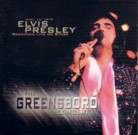
Quote:
"Elvis Presley is the greatest cultural force in the 20th century."
(Leonard Bernstein)
Quote:
"If you're an Elvis fan, no explanation is necessary; If you're not an Elvis fan, no explanation is possible."
(George Klein)
Quote:
"For a dead man, Elvis Presley is awfully noisy."
(Professor Gilbert B. Rodman)
Quote:
"History has him as this good old country boy, Elvis is about as country as Bono!"
(Jerry Schilling)
Quote:
"Absolute id crashed into absolute superego...as the uptightset man in America shook hands with just about the loosest."
(Mark Feeney on the 'Elvis meets Nixon' meeting)
Quote:
"Elvis is everywhere"
(Mojo Nixon & Skid Roper)
Quote:
"...especially in the South, they talk about Elvis and Jesus in the same breath"
(Michael Ventura, LA Weekly)
Quote:
"The image is one thing and the human being is another...it's very hard to live up to an image"
(Elvis Presley, Madison Square Garden press conference, 1972)
Quote:
"Elvis was a major hero of mine. I was actually stupid enough to believe that having the same birthday as him actually meant something"
(David Bowie)
Quote:
"No-one, but no-one, is his equal, or ever will be. He was, and is supreme"
(Mick Jagger)
Quote:
"I wasn't just a fan, I was his brother...there'll never be another like that soul brother"
(Soul legend, James Brown)
Quote:
"Before Elvis there was nothing!"
(John Lennon)
Quote:
"There were rock 'n' roll records before Heartbreak Hotel, but this was the one that didn't just open the door…it literally blasted the door off its rusted, rotten, anachronistic hinges…. producing....no propelling...an unstoppable, fundamental and primordial shift in not only musical... but social, political and cultural history"
(JNP, BBC website)
Quote:
"Elvis, the musician, is largely a relic belonging to the baby boomer generation...Elvis, the icon, is arguably one of the most potent symbols of popular culture"
( Dr. John Walker)
|
|
'Love Me Tender - Special Edition'
DVD review - by Harley Payette
|
-EIN contributor Harley Payette reviews the new 50th Anniversary special edition release of Elvis' first film, 'Love Me Tender'.
2013 - NOW ON BLU-RAY -'Love Me Tender' Blu-Ray Edition Review: Elvis' first movie now out on high-quality Blu-Ray in 1080 presentation. This release contains the same extras as featured on the 2006 50th Anniversary DVD release with the added commentary by Jerry Schilling plus short bonus documentaries. However since 2006 a large number of viewers have moved across to High-Definition viewing at home and enjoy the look of movies in their own Home-Cinema set-up.
'Love Me Tender' was always an oddity as the first movie vehicle for the King Of Rock'n'Roll - so is this BluRay upgrade really worth it?
Go HERE as EIN's Piers Beagley - with the help of Harley Payette - checks out this new Blu-ray release. Plus some cool Screen Grabs..
However at only $14 how can you go wrong? Let's hope this leads to Blu-ray releases of other Elvis movies.
(DVD Reviews, Source;ElvisInfoNet) |
|
For the first time an Elvis Presley film has been given the special edition
treatment on DVD with Fox's re-release 50th anniversary edition of Elvis' first
movie "Love Me Tender". The results are not quite everything they could be but more than worth an upgrade for devotees of Elvis and properly respectful of this important work and cultural icon.
Included in the new special features is Jerry Schilling's audio commentary where he provides thoughtful insights into Elvis himself, as well as Elvis' film career.
There are also the obligatory trailers for "Flaming Star" and "Wild in the Country" - which if you don't have is of huge interest to fans as it features Elvis singing a few seconds of 'Lonely Man' a song cut from the film. |
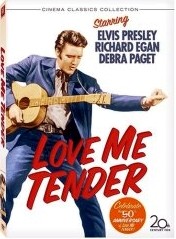 |
The minute you pick up the DVD this has the previous edition beat as the film comes in a nice protective box around the clam-shell DVD case. The box and case feature a colorized picture of Elvis dancing at the school raising scene from the movie. The previous case had a picture from "Flaming Star". Right away you can see the improvement in consideration.
Inside there's a insert type mini booklet that lists the scene breaks but also provides some sepia pictures from the movie as well as brief history. There is a small envelope with four recreated b/w movie lobby cards.
The DVD itself also offers significant improvement. The picture is about the same as the previous release but that was a very beautiful print in anamorphic widescreen marred only by some minor specs late in Elvis' part in the train break scene.
Contrary to speculation, there is only a b/w print and no colorized version. That would have been a nice bonus but unnecessary. The sound though is a considerable improvement. You can hear every scrap of distant dialogue and every tap of a horse's shoe. |
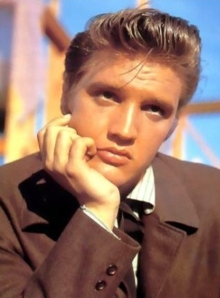 |
As bonuses the DVD features three featurettes coming in between about nine and 15 minutes apiece. These deal with the origin of the film, the history of the song "Love Me Tender" and Elvis' relationship with Tom Parker. These are certainly an upgrade over the previous releases but in many ways a missed opportunity.
Elvis historians are interviewed like Alanna Nash, Steve Tamerius, and Steve Pond (who provided the text for a picture book on the movie in the late 1980s) as well as associates like Scotty Moore and Jerry Schilling and sundry pop culture experts like the current music editor of "Rolling Stone". The results are a mixed bag.
There are some great bits of trivia. We find out that's Dick Sargent- Darrin #2 on "Bewitched"- who tells Richard Egan on the roadside that the war is over. We also find out that "Stay Away Joe" and "Flaming Star" co-star LQ Jones has a small role in the movie as one of the soldiers who side with Neville Brand.
There is an odd bit of spot on analysis as well with the RS critic pointing out that boundaries that LMT broke as a song and noting that the song has become a fact of life almost beyond criticism. Alanna Nash's insights on the Colonel are also fascinating if not always 100 percent accurate. And there is also some nice insight all around on what a challenge this movie was for Elvis. It's easy to forget in 2006 but in 1956 this was the first time that Elvis ever acted, ever visited a movie set.
Still there's not nearly enough about the production of the movie. There isn't anything about the lost verses of "Love Me Tender" etc. There are also NO current or vintage interviews with any of the cast and crew of LMT.
Worse there is lame backing music on some of the bits and even lamer re-enactments. For instance if Nash is talking about Elvis signing a contract, they show a hand writing on a piece of paper. Most ridiculously they show Elvis and the Colonel arguing in silhouette. The actor playing Elvis has a mountain of hair and bounces his head up and down to indicate the argument and is quite unintentionally hilarious.
I'm glad this stuff was there but I wish more discipline and in-depth scholarship went into it.
There is also a photo gallery and it is quite extensive. There may be more than 100 photos of Elvis and his co-stars many predictable but just as many rare. There are even reproductions of correspondence between RCA and Parker.
There are also the obligatory trailers and trailers for "Flaming Star" and "Wild in the Country". WITC, if you don't have the trailer, is of huge interest to fans as it features Elvis singing a few seconds of "Lonely Man" a song cut from the film.
Best of all the special features is Jerry Schilling's audio commentary. While Schilling is not my first choice for an audio commentary on this movie since he was back in Memphis when it was being made, he provides a fascinating audio track. A bit slow at times, Schilling provides little insight into the making of the film or its stars but lots of insight into Elvis himself and Elvis' film career. It's like finding a new text. It's very thoughtful.
Though Schilling white washes some of Elvis' womanizing in relation to his movie co-stars, he does a present a complex warts and all but sympathetic presentation of Elvis and Parker. |
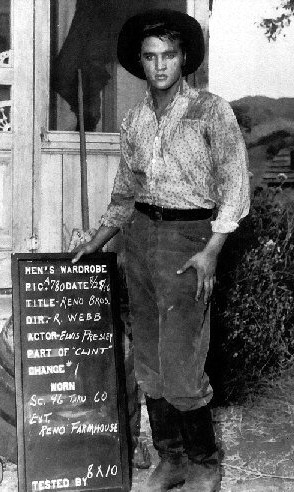 |
He is very insightful into the balance a popular artist has to find between commercial success and artistic achievement and how Elvis was torn by that. He also successfully characterizes the difficulties that Elvis had in paving the way for a new type of star.
For me this anecdote would cause some fans to rethink some long held positions. "I was there when Elvis turned down a script. He said 'I don't want to do this' and they said 'You won't get to work again' This is not hearsay."
Schilling gives Parker his due in creating the Elvis phenomenon but doesn't blink from the fact that in disputes with outside entities he sided with them not Elvis. To me, he gives Parker a little too much slack in an area like this but it fits in with the three-dimensional real life portrait he wants to give.
He also creates a lot of context not only for Elvis' time but also connecting Elvis to figures in our time.
One of the most interesting bits in defining Elvis that Schilling hits on is the similarity between the body mannerisms of Vernon and Elvis Presley. Elvis apparently took a lot of his personal style from his dad. You can tell in Schilling's recollection that Elvis' parents were real people in his life.
There are pure fun anecdotes as well including Elvis hanging with Nat King Cole at a Hollywood Party. I won't give everything away so as to let you discover some of this stuff for yourself.
Schilling is respectful enough of Elvis and his fans that he never comments while Elvis is singing. It's worth the price of admission alone.
Does the movie deserve this kind of treatment? I say yes because of Elvis' importance as a cultural pioneer and because this was his first movie and a crucial part of that phenomenon.
As a movie in 2006 I expect it plays close to the same it played in 1956: Not Bad. It's not terribly good but it is certainly interesting and not an embarrassment.
There are of course period flaws like the fact that several of the Rebel fighters including two of three older Reno boys have northern accents. For a '50s movie though there's less of this than you would think. There's also the fact that the thrust of the train robbery story and many of the action scenes are cliche'd.
Still, it's not a bad little screenplay brougt to life with some competent albeit unspectacular direction. Some of the dialogue captures some of the Post War resentment of the Union in the South quite nicely. The sense of bitterness that went along with defeat including the scene where Egan marvels at the savagery of war that his father could have been killed by soldiers at his home.
There is also the fascinating family dynamic where the Egan character is the sun and the Elvis character is an inconvenient after thought.
The dynamic between Elvis, Egan and Paget is good and they have chemistry. The love that Egan and Elvis' character have for each other gives Egan' s character a nobility he wouldn't otherwise possess although in some ways it's a cliche.
(Elvis & Debra Paget - 'They had chemistry') |
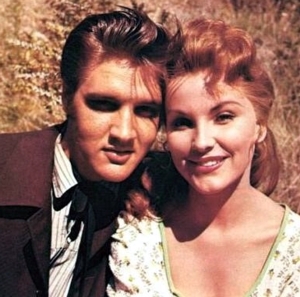 |
There's also a good supply of character actors like professional villain Neville Brand and professional mother Mildred Dunnock (you might remember her as the invalid in the wheel chair that Richard Widmark kicked down the stairs in "Kiss of Death.") to fill in the spots the screenplay misses. In terms of characterizations since there are so many characters in such a story it misses lot. Some characters exist solely to finish another character's sentences.
The story is familiar to nearly all Elvis fans by now. Richard Egan and his band of cohorts including two of his brothers rob a federal train for the army after the Civil War has ended. They don't know the war's over at the time but when they find out they figure they're entitled to the money as the spoils of war. Egan plans to take the money and go home and marry his sweetheart.
Unfortunately for Egan, he finds out when he gets home that his family think he's dead and his youngest brother Clint (Elvis), who did not go off to war, married her. (This is a very realistic touch as stuff like this happened in times of tragedy in those days.)
When Vance (Egan) and the brothers get pinched by some federal men for the job they make a deal to give back the money. Brand balks at this plan and convinces Elvis that Egan plans to run off with Paget. This is a double hurt for Elvis who worships Egan.
Elvis gets so worked up that Brand convinces him to shoot Egan. Immediately he feels remorse and shoots at Brand who tries to steal the money from Egan (although he has already given it back). Brand shoots Elvis dead. We move to Elvis' funeral and a ghostly apparition appears singing "Love Me Tender" giving us the indication that Elvis is in heaven and gives Paget and Egan his approval.
One thing that's surprising watching the movie today is that Elvis was only one movie in and he was already playing a Christ role complete with resurrection. The movie can be seen as a religious allegory with Elvis the essence of pure innocence being corrupted by the sins of others- the lust of Paget and Egan, Egan's envy of the Presley's marriage, the greed of the soldiers and Brand, the anger of Brand. He winds up literally dying for their sins. To keep this all from being too blasphemous, Elvis' Clint unlike Christ is actually corrupted albeit temporarily.
All that aside what makes the film interesting today is Elvis' presence and I don't mean that from a strictly historical sense. As a performer Elvis brings life to this piece. Schilling points out in the commentary that Elvis gives a method performance in the film and I think he's right.
One of the things that makes the piece interesting 50 years away is the clash between acting styles. Egan is all solid professionalism and is in many ways boring. He matters to us because he matters to Elvis' character who is all uncontrolled raw nerve.
Quite honestly Elvis overacts in some of his scenes especially early on and his timing and delivery are some times off. (I should note that Elvis is far outdone in the overacting department by Paget who heaves her breast constantly in the hopes of stimulating adolescent male sexual activity. She's a seething woman.)
There is however an eager to please quality about the performance that is not only endearing but fits the character. There is also an actor's deterimination at work here. Look at the way Elvis stays in character all through the scene where he's brothers are being cross-examined at the school house even though he has no lines. Not bad stuff for an amateur in his first performance. |
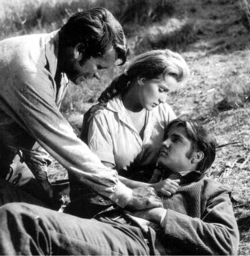 |
Even more Elvis grows into the performance as the film goes on and eventually through his ornate display of emotion gives the movie a pulse.
Elvis' acting echoes the movie itself which starts out fairly drably and improves it goes on. When Elvis goes on Paget for leaving him (he thinks) he is very convincing. When he shoots Egan and is screaming "Get away from him, leave him alone" there's a real expressive quiver in his performance. His amatuerishness helps him here as his character is reaching for the words that won't come due to the depth of his shock and heartbreak. There's just a reality achieved here and when he dies you actually feel a sense of tragedy and loss.
Elvis has created someone we know and love and when he comes up at the end singing looking impossibly cool we also realize a sense of beauty. I know it's partly because of the way we feel about Elvis and Elvis' early departure adds an extra sense of loss but still it's quite an achievement for a guy who had never acted in his life before to create that sense of attachment even though we know he'll back in "Loving You".
Elvis' less-stylized acting rubbed off on the rest of the cast. Watch Brand's quick look at Elvis after he fires the shot. It's a great bit, he can't believe it himself.
Stylistic flaws and overacting to the side the weakest part of Elvis' performance is his musical numbers. Not only are his movements way too sexual and outrageous for their time but his facial expressions let us in on a subversive nature that was true to Elvis but alien to this character.
The songs themselves except the title song are fairly rinky dink though they do sound old fashioned enough except for Elvis' phrasing which is far too individual for the time period.
All in all, "Love Me Tender" is a deeply flawed movie but one that is worth going back to more than once for a variety of reasons and this is the best presentation on DVD of this or any Elvis movie to date.
This Spotlight written by EIN contributor Harley Payette.
-Copyright, April 2006-
Click to comment on this article.
|
Quote:"Elvis Presley is the supreme socio-cultural icon in the history of pop culture"
(Dr. Gary Enders)
Quote:" Elvis is the 'glue' which holds our society together....which subconciously gives our world meaning"
(Anonymous)
Quote:"Eventually everybody has to die, except Elvis"
(humorist Dave Barry)
Quote:"He is the "Big Bang", and the universe he detonated is still expanding, the pieces are still flying"
(Greil Marcus, "Dead Elvis")
Quote:"I think Elvis Presley will never be solved"
(Nick Tosches)
Quote:"He was the most popular man that ever walked on this planet since Christ himself was here"
(Carl Perkins)
Quote:"When I first heard Elvis' voice I just knew I wasn't going to work for anybody...hearing him for the first time was like busting out of jail"
(Bob Dylan)
Quote:"When we were kids growing up in Liverpool, all we ever wanted was to be Elvis Presley"(Sir Paul McCartney)
|


